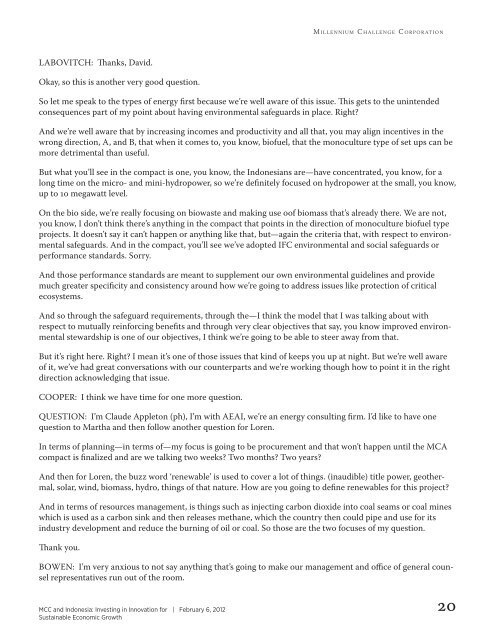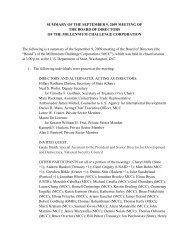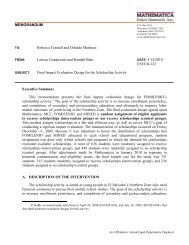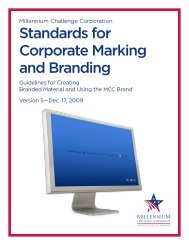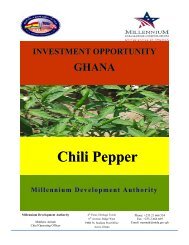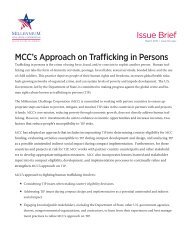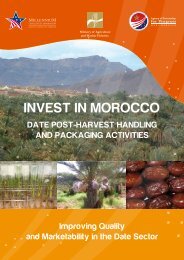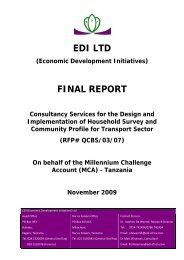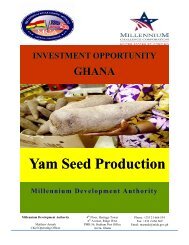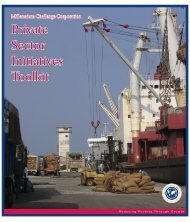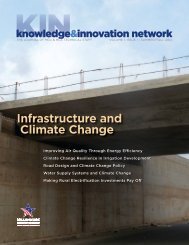Transcript - Millennium Challenge Corporation
Transcript - Millennium Challenge Corporation
Transcript - Millennium Challenge Corporation
You also want an ePaper? Increase the reach of your titles
YUMPU automatically turns print PDFs into web optimized ePapers that Google loves.
LABOVITCH: Thanks, David.<br />
Okay, so this is another very good question.<br />
So let me speak to the types of energy first because we’re well aware of this issue. This gets to the unintended<br />
consequences part of my point about having environmental safeguards in place. Right?<br />
And we’re well aware that by increasing incomes and productivity and all that, you may align incentives in the<br />
wrong direction, A, and B, that when it comes to, you know, biofuel, that the monoculture type of set ups can be<br />
more detrimental than useful.<br />
But what you’ll see in the compact is one, you know, the Indonesians are—have concentrated, you know, for a<br />
long time on the micro- and mini-hydropower, so we’re definitely focused on hydropower at the small, you know,<br />
up to 10 megawatt level.<br />
On the bio side, we’re really focusing on biowaste and making use oof biomass that’s already there. We are not,<br />
you know, I don’t think there’s anything in the compact that points in the direction of monoculture biofuel type<br />
projects. It doesn’t say it can’t happen or anything like that, but—again the criteria that, with respect to environmental<br />
safeguards. And in the compact, you’ll see we’ve adopted IFC environmental and social safeguards or<br />
performance standards. Sorry.<br />
And those performance standards are meant to supplement our own environmental guidelines and provide<br />
much greater specificity and consistency around how we’re going to address issues like protection of critical<br />
ecosystems.<br />
And so through the safeguard requirements, through the—I think the model that I was talking about with<br />
respect to mutually reinforcing benefits and through very clear objectives that say, you know improved environmental<br />
stewardship is one of our objectives, I think we’re going to be able to steer away from that.<br />
But it’s right here. Right? I mean it’s one of those issues that kind of keeps you up at night. But we’re well aware<br />
of it, we’ve had great conversations with our counterparts and we’re working though how to point it in the right<br />
direction acknowledging that issue.<br />
COOPER: I think we have time for one more question.<br />
QUESTION: I’m Claude Appleton (ph), I’m with AEAI, we’re an energy consulting firm. I’d like to have one<br />
question to Martha and then follow another question for Loren.<br />
In terms of planning—in terms of—my focus is going to be procurement and that won’t happen until the MCA<br />
compact is finalized and are we talking two weeks? Two months? Two years?<br />
And then for Loren, the buzz word ‘renewable’ is used to cover a lot of things. (inaudible) title power, geothermal,<br />
solar, wind, biomass, hydro, things of that nature. How are you going to define renewables for this project?<br />
And in terms of resources management, is things such as injecting carbon dioxide into coal seams or coal mines<br />
which is used as a carbon sink and then releases methane, which the country then could pipe and use for its<br />
industry development and reduce the burning of oil or coal. So those are the two focuses of my question.<br />
Thank you.<br />
BOWEN: I’m very anxious to not say anything that’s going to make our management and office of general counsel<br />
representatives run out of the room.<br />
MCC and Indonesia: Investing in Innovation for | February 6, 2012<br />
Sustainable Economic Growth<br />
20


